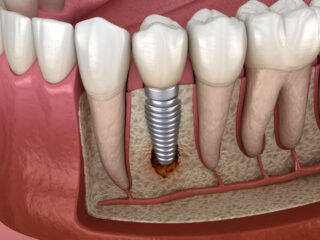
More Dental Health Articles
Peri-Implantitis: Understanding and Preventing Implant Complications

Dental implants have revolutionized modern dentistry, providing an effective solution for replacing missing teeth. However, as with any medical procedure, complications can arise. One such complication is peri-implantitis, an inflammatory condition that affects the soft and hard tissues surrounding dental implants. In this article, we will delve into the causes, symptoms, treatment, and prevention of peri-implantitis.
Understanding Peri-Implantitis
Peri-implantitis refers to the inflammation and subsequent destruction of the tissues surrounding dental implants. It is primarily caused by bacterial infection and is characterized by pus, bleeding, swelling, and the loss of supporting bone. Poor oral hygiene, smoking, systemic diseases, genetic factors, and implant-related factors such as surface roughness or misfit can contribute to the development of peri-implantitis.
Recognizing the Symptoms
Early detection of peri-implantitis is crucial for successful treatment. Some common symptoms include bleeding upon probing, swelling or redness around the implant site, pain or discomfort, and increased pocket depth around the implant. Patients with dental implants should be vigilant in monitoring these signs and seek professional assistance if any concerns arise.
Treatment Options
The treatment of peri-implantitis depends on the severity of the condition. In its initial stages, non-surgical approaches such as professional cleaning, meticulous oral hygiene instructions, and antimicrobial therapy may be sufficient. However, advanced cases may require surgical intervention, including implant surface decontamination, bone grafting, or guided tissue regeneration. It is essential to consult with a dental professional who specializes in implantology for appropriate diagnosis and treatment planning.
Prevention is Key
Prevention plays a crucial role in minimizing the risk of peri-implantitis. Maintaining excellent oral hygiene practices, including regular brushing, flossing, and interdental cleaning, is paramount. Routine dental visits for professional cleanings and check-ups allow early detection of any implant-related issues. Additionally, avoiding tobacco use and managing systemic conditions, such as diabetes, can significantly reduce the risk of complications.
Peri-implantitis is a concerning complication that can compromise the success of dental implants. Recognizing the symptoms and seeking timely treatment are vital for a positive outcome. Furthermore, adopting preventive measures, including diligent oral hygiene practices and regular dental visits, can greatly reduce the risk of developing peri-implantitis. By staying informed and proactive, individuals with dental implants can maximize their oral health and enjoy the long-term benefits of their restorative treatment. Remember, a healthy implant requires a healthy foundation.
Other Articles You May Find of Interest...
- Appliances Are In Now: How To Manage TMJ Disorder
- Why The Tooth Fairy Is Very Fun – and Important!
- Let’s Smile Dental’s 7&Up Club
- Strengthening Smiles: Understanding the Importance of Splinting Periodontally Involved Teeth
- Understanding Soft Tissue Grafting: A Key To Periodontal Health
- New Solutions for Dentures and Dental Implants
- Cerec Dental Technology

















